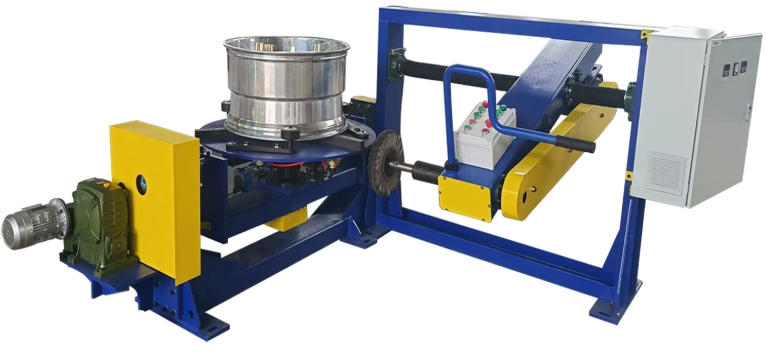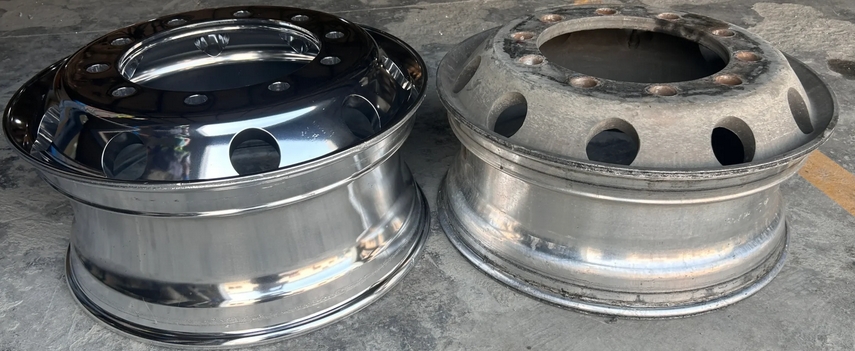Wheel Polishing Machine and Used Wheel Hub Polishing: A Complete Guide
Jun 5 ,2025
Introduction to Wheel Hub Polishing
Wheel hub polishing is a critical process in the automotive industry, ensuring the durability, aesthetics, and performance of wheel components. With advancements in technology, modern polishing equipment now offers higher efficiency, precision, and environmental sustainability. This article explores the latest developments in wheel hub polishing, with a focus on both new and used wheel hub restoration.
Why Wheel Hub Polishing Matters
- Enhances Aesthetics: Polishing removes scratches, oxidation, and imperfections, restoring the wheel’s original shine.
- Improves Durability: A polished surface reduces wear and corrosion, extending the wheel’s lifespan.
- Ensures Safety: Properly polished wheels maintain structural integrity, reducing the risk of mechanical failure.
- Environmental Benefits: Advanced polishing equipment reduces energy consumption and waste, aligning with green manufacturing practices.
Used Wheel Hub Polishing: A Cost-Effective Solution
Used wheel hubs often require specialized polishing to restore their functionality and appearance. The process involves:
- Cleaning: Thoroughly remove dirt, grease, and debris using high-pressure washing or chemical solvents.
- Grinding: Use progressively finer grit sandpaper or grinding tools to eliminate deep scratches and oxidation.
- Polishing: Apply mechanical or manual polishing techniques with specialized compounds to achieve a smooth, reflective finish.
- Protection: Apply a protective coating (e.g., wax or paint) to prevent future damage and enhance visual appeal.
Modern polishing equipment, such as the motorized polishing machine and edge-grinding device, streamlines this process while ensuring consistent quality.
Innovations in Wheel Hub Polishing Technology
Recent patents and technological advancements have revolutionized the wheel hub polishing industry. Notable examples include:
- Automated Polishing Systems: Devices like the aluminum alloy wheel polishing apparatus use rotating mechanisms and adjustable clamps to ensure uniform polishing, reducing manual labor and energy consumption.
- Smart Dust Extraction: Patents such as the wheel hub edge-grinding device integrate dust collection systems to improve workplace safety and environmental compliance.
- Adaptive Fixtures: The vehicle wheel polishing equipment features adjustable clamps that accommodate various wheel sizes, enhancing versatility and efficiency.

This specifically designed wheel rim polishing machine can retreat tire, burr removing, and grinding to a high mirror finish. It solves the problem of poor surface grinding and the high labor costs of manual polishers. It is a good tool for polishing car and truck wheels.
Industry Trends and Market Growth
The global wheel hub polishing market is driven by factors such as:
- Increasing Vehicle Production: The rise in automotive manufacturing demands efficient polishing solutions.
- Consumer Demand for Aesthetics: Car owners prioritize vehicle appearance, boosting demand for high-quality polishing services.
- Environmental Regulations: Stricter emissions and waste management laws are pushing manufacturers to adopt eco-friendly polishing technologies.
- Technological Integration: The adoption of IoT and AI in polishing equipment enables real-time monitoring and precision control.
Choosing the Right Wheel Polishing Equipment
Selecting the appropriate polishing equipment depends on your production scale, budget, and technical requirements. Key considerations include:
- Automation Level: Manual, semi-automatic, or fully automated systems for varying production needs.
- Material Compatibility: Equipment designed for aluminum, steel, or composite materials.
- Energy Efficiency: Low-energy consumption models to reduce operational costs.
- Customization Options: Adjustable settings for different wheel sizes and surface conditions.
Conclusion
Wheel hub polishing is a vital process in the automotive industry, combining technical precision with aesthetic enhancement. With innovations in equipment design and environmental sustainability, modern polishing solutions offer unparalleled efficiency and quality. Whether restoring used wheel hubs or manufacturing new ones, investing in advanced polishing technology ensures competitive advantage and customer satisfaction.



